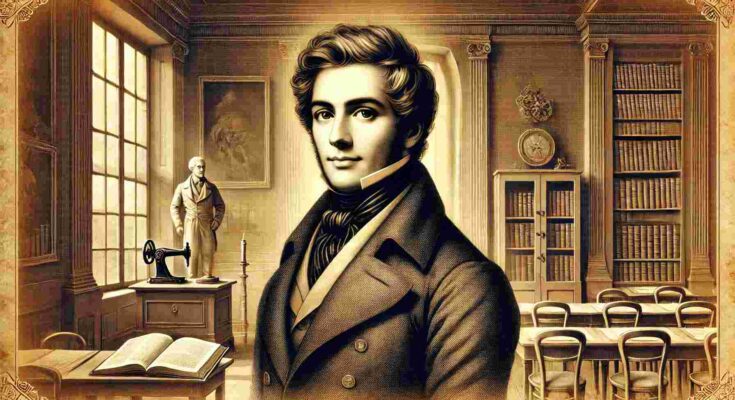Contents
- 1 Introduction
- 2 Early Life and Education
- 3 Achievements in Education
- 4 Advocacy and Activism
- 5 Founding the Société Centrale des Sourds-Muets
- 6 Cultural Impact and Events
- 7 Writing and Intellectual Contributions
- 8 Key Publications
- 9 Honours and Recognition
- 10 Additional Accolades and Influence
- 11 The Legacy of Ferdinand Berthier
- 12 Modern-Day Influence
- 13 Conclusion
- 14 FAQs
- 14.1 Who was Ferdinand Berthier?
- 14.2 What was Ferdinand Berthier’s main achievement?
- 14.3 Why is Ferdinand Berthier significant in deaf history?
- 14.4 What honour did Ferdinand Berthier receive for his work?
- 14.5 What is Ferdinand Berthier’s legacy?
- 14.6 How did Ferdinand Berthier influence modern deaf education?
- 14.7 What are some notable works by Ferdinand Berthier?
Introduction
Ferdinand Berthier, a name that resonates deeply within the history of deaf education and activism, was a remarkable figure whose contributions inspire generations. Known for his tireless advocacy for the rights and education of people who are deaf or hard of hearing, Berthier’s legacy is as relevant today as it was in his lifetime. This article delves into Berthier’s life, accomplishments, and lasting impact, providing a comprehensive look at why he is celebrated as a pioneer.
Early Life and Education
Ferdinand Berthier was born in Louhans, France, on September 30, 1803. From an early age, Berthier faced the challenges of being deaf. However, these obstacles did not hinder his determination to seek knowledge and become an active member of society. He attended the Institut National des Jeunes Sourds de Paris (National Institute for Deaf-Mutes), where teachers like Abbé Sicard and Jean Massieu greatly influenced him. Their guidance helped shape his passion for advocating for the deaf community.
Achievements in Education
Berthier did not just excel as a student; he became a renowned educator at the very institute that nurtured his development. His teaching approach was progressive, focusing on holistic education and empowerment. Berthier believed that deaf individuals deserved an education equal to that of their hearing peers. His efforts helped set the foundation for inclusive educational practices that continue to evolve today.
Advocacy and Activism
One of Berthier’s most significant contributions was his activism. He was instrumental in organizing the first-ever gatherings of deaf individuals, which led to the formation of cultural and social associations for the deaf community. Berthier worked tirelessly to promote sign language recognition as an essential tool for communication and learning.
Founding the Société Centrale des Sourds-Muets
In 1838, Ferdinand Berthier founded the Société Centrale des Sourds-Muets (Central Society of Deaf-Mutes) in Paris. This organization aimed to unite deaf individuals and advocate for their rights, establishing a strong sense of community. Berthier’s leadership in this society underscored his belief in the power of collective action to create societal change.
Cultural Impact and Events
Berthier’s influence extended beyond the formation of the society. He organized festivals and public events celebrating deaf culture, where deaf individuals could showcase their talents, share stories, and build a sense of pride in their identity. These events helped bridge the gap between the hearing and deaf communities, promoting mutual understanding and respect.
Writing and Intellectual Contributions
Ferdinand Berthier was also a prolific writer. His works, which include essays, articles, and books, were crucial in spreading awareness about the challenges and capabilities of the deaf community. His writings argued for better policies, educational reforms, and social recognition of people who are deaf or hard of hearing.
Key Publications
Berthier’s notable works include “L’Abbé de l’Épée” and various essays highlighting the importance of deaf culture and language. These informative publications served as a call to action for the deaf and hearing communities to foster mutual understanding. His books often emphasized the intellectual and social capabilities of the deaf, challenging stereotypes and advocating for societal change.
Honours and Recognition
Berthier’s tireless work did not go unnoticed. In 1849, he was awarded the Légion d’Honneur, making him the first deaf person to receive France’s highest order of merit. This accolade was a significant milestone, symbolizing the recognition of his invaluable contributions to society.
Additional Accolades and Influence
Berthier’s influence extended far beyond France. His work inspired similar movements in other countries, encouraging educators and activists to adopt more inclusive approaches to deaf education. His legacy influenced educational policies and advocacy groups worldwide, leading to a broader recognition of sign language and the rights of deaf individuals.
The Legacy of Ferdinand Berthier
Ferdinand Berthier’s legacy is profound and multifaceted. His pioneering efforts laid the groundwork for future advancements in deaf education and advocacy. The community-building initiatives he championed paved the way for modern organizations supporting the rights and education of deaf individuals worldwide. Berthier’s work reminds us of the power of resilience, community, and the enduring impact of advocating for one’s rights.
Modern-Day Influence
Today, Ferdinand Berthier’s teachings and advocacy are echoed in the practices of contemporary deaf education programs. His emphasis on equal opportunities and respect for sign language has influenced policy changes and educational reforms that ensure more inclusive environments for deaf students. Organizations that support the deaf community still draw upon Berthier’s principles of unity, empowerment, and education.
Conclusion
Ferdinand Berthier was more than an educator and advocate; he was a visionary who believed in the potential and equality of all people, regardless of their hearing ability. His life’s work has left an indelible mark on the deaf community, making him a figure of admiration and respect. To this Day, Ferdinand Berthier’s contributions inspire those who continue to fight for inclusivity and equality in education and society.
FAQs
Who was Ferdinand Berthier?
Ferdinand Berthier was a prominent 19th-century educator and activist for the deaf community. He is known for his contributions to deaf education and advocacy.
What was Ferdinand Berthier’s main achievement?
Berthier’s most significant achievement was founding the Société Centrale des Sourds-Muets and advocating for sign language recognition.
Why is Ferdinand Berthier significant in deaf history?
He is significant for his pioneering efforts in organizing the deaf community and advocating for their rights, which laid the foundation for future advancements in deaf education and culture.
What honour did Ferdinand Berthier receive for his work?
In 1849, he was awarded the Légion d’Honneur, becoming the first deaf person to receive this prestigious French accolade.
What is Ferdinand Berthier’s legacy?
His legacy is one of empowerment and advocacy, emphasizing the importance of education, community, and sign language recognition as a fundamental aspect of deaf culture.
How did Ferdinand Berthier influence modern deaf education?
Berthier’s principles of inclusive education and community activism continue to shape contemporary educational practices and policies for people who are deaf or hard of hearing.
What are some notable works by Ferdinand Berthier?
His works include “L’Abbé de l’Épée” and several essays that underscore the significance of deaf culture and education.


